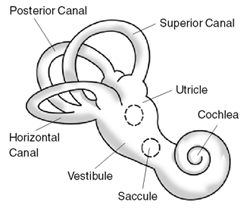Balance disorder

Editor-In-Chief: Prab R Tumpati, MD
Obesity, Sleep & Internal medicine
Founder, WikiMD Wellnesspedia &
W8MD's medical weight loss NYC, sleep center NYC
Philadelphia medical weight loss and Philadelphia sleep clinics
| Balance disorder | |
|---|---|

| |
| Synonyms | N/A |
| Pronounce | N/A |
| Specialty | N/A |
| Symptoms | Dizziness, vertigo, unsteadiness, nausea |
| Complications | Falls, injuries |
| Onset | Any age, more common in older adults |
| Duration | Varies |
| Types | N/A |
| Causes | Inner ear problems, neurological disorders, medications, head injury |
| Risks | Age, ear infections, head trauma, medications |
| Diagnosis | Clinical examination, audiometry, vestibular testing |
| Differential diagnosis | Meniere's disease, vestibular neuritis, labyrinthitis, migraine-associated vertigo |
| Prevention | N/A |
| Treatment | Vestibular rehabilitation therapy, medication, surgery |
| Medication | N/A |
| Prognosis | Varies depending on cause |
| Frequency | Common, especially in older adults |
| Deaths | N/A |
Balance disorder is a condition that makes an individual feel unsteady or dizzy, as if they are moving, spinning, or floating, even when they are standing still or lying down. Balance disorders can be caused by several different conditions affecting the inner ear, brain, or sensory nerve pathways. The sense of balance is primarily controlled by the vestibular system in the inner ear, alongside inputs from the visual system and the proprioceptors in the muscles and joints, which help the body understand its position in space.
Causes[edit]
Balance disorders can have various causes, including but not limited to:
- Vestibular disorders: Problems in the inner ear, such as benign paroxysmal positional vertigo (BPPV), Meniere's disease, and vestibular neuritis.
- Neurological disorders: Conditions that affect the brain or nerves, such as stroke, multiple sclerosis, and Parkinson's disease.
- Medications: Some medications can affect balance as a side effect.
- Infections: Ear infections can lead to temporary balance problems.
- Head injuries: Trauma to the head can disrupt the inner ear or brain functions related to balance.
Symptoms[edit]
Common symptoms of balance disorders include:
- Dizziness or vertigo (a spinning sensation)
- Feeling of floating or feeling as if one is going to fall
- Blurred vision
- Confusion or disorientation
- Nausea and vomiting
- Changes in heart rate or blood pressure
- Fear, anxiety, or panic
Diagnosis[edit]
Diagnosing balance disorders involves a thorough medical history review and physical examination, including neurological tests. Additional tests may include:
- Hearing tests
- Balance tests, such as the posturography test
- Imaging tests, like MRI or CT scans, to look at the inner ear and brain
- Blood tests to check for infections, inflammation, or other conditions that could affect balance
Treatment[edit]
Treatment for balance disorders depends on the underlying cause. Options may include:
- Medications to treat the symptoms or underlying conditions
- Physical therapy or vestibular rehabilitation to improve balance
- Surgery, in cases where there is a structural problem in the inner ear
- Lifestyle changes, such as dietary modifications in the case of Meniere's disease
Prevention[edit]
While not all balance disorders can be prevented, some measures can reduce the risk or severity of symptoms:
- Avoiding rapid changes in position
- Using caution on uneven surfaces
- Reducing or eliminating use of substances that can affect balance, such as alcohol and certain medications
- Regular exercise to improve strength, flexibility, and balance
See Also[edit]
Ad. Transform your life with W8MD's Budget GLP-1 injections from $49.99


W8MD offers a medical weight loss program to lose weight in Philadelphia. Our physician-supervised medical weight loss provides:
- Weight loss injections in NYC (generic and brand names):
- Zepbound / Mounjaro, Wegovy / Ozempic, Saxenda
- Most insurances accepted or discounted self-pay rates. We will obtain insurance prior authorizations if needed.
- Generic GLP1 weight loss injections from $49.99 for the starting dose of Semaglutide and $65.00 for Tirzepatide.
- Also offer prescription weight loss medications including Phentermine, Qsymia, Diethylpropion, Contrave etc.
NYC weight loss doctor appointmentsNYC weight loss doctor appointments
Start your NYC weight loss journey today at our NYC medical weight loss and Philadelphia medical weight loss clinics.
- Call 718-946-5500 to lose weight in NYC or for medical weight loss in Philadelphia 215-676-2334.
- Tags:NYC medical weight loss, Philadelphia lose weight Zepbound NYC, Budget GLP1 weight loss injections, Wegovy Philadelphia, Wegovy NYC, Philadelphia medical weight loss, Brookly weight loss and Wegovy NYC
|
WikiMD's Wellness Encyclopedia |
| Let Food Be Thy Medicine Medicine Thy Food - Hippocrates |
Medical Disclaimer: WikiMD is not a substitute for professional medical advice. The information on WikiMD is provided as an information resource only, may be incorrect, outdated or misleading, and is not to be used or relied on for any diagnostic or treatment purposes. Please consult your health care provider before making any healthcare decisions or for guidance about a specific medical condition. WikiMD expressly disclaims responsibility, and shall have no liability, for any damages, loss, injury, or liability whatsoever suffered as a result of your reliance on the information contained in this site. By visiting this site you agree to the foregoing terms and conditions, which may from time to time be changed or supplemented by WikiMD. If you do not agree to the foregoing terms and conditions, you should not enter or use this site. See full disclaimer.
Credits:Most images are courtesy of Wikimedia commons, and templates, categories Wikipedia, licensed under CC BY SA or similar.
Translate this page: - East Asian
中文,
日本,
한국어,
South Asian
हिन्दी,
தமிழ்,
తెలుగు,
Urdu,
ಕನ್ನಡ,
Southeast Asian
Indonesian,
Vietnamese,
Thai,
မြန်မာဘာသာ,
বাংলা
European
español,
Deutsch,
français,
Greek,
português do Brasil,
polski,
română,
русский,
Nederlands,
norsk,
svenska,
suomi,
Italian
Middle Eastern & African
عربى,
Turkish,
Persian,
Hebrew,
Afrikaans,
isiZulu,
Kiswahili,
Other
Bulgarian,
Hungarian,
Czech,
Swedish,
മലയാളം,
मराठी,
ਪੰਜਾਬੀ,
ગુજરાતી,
Portuguese,
Ukrainian
